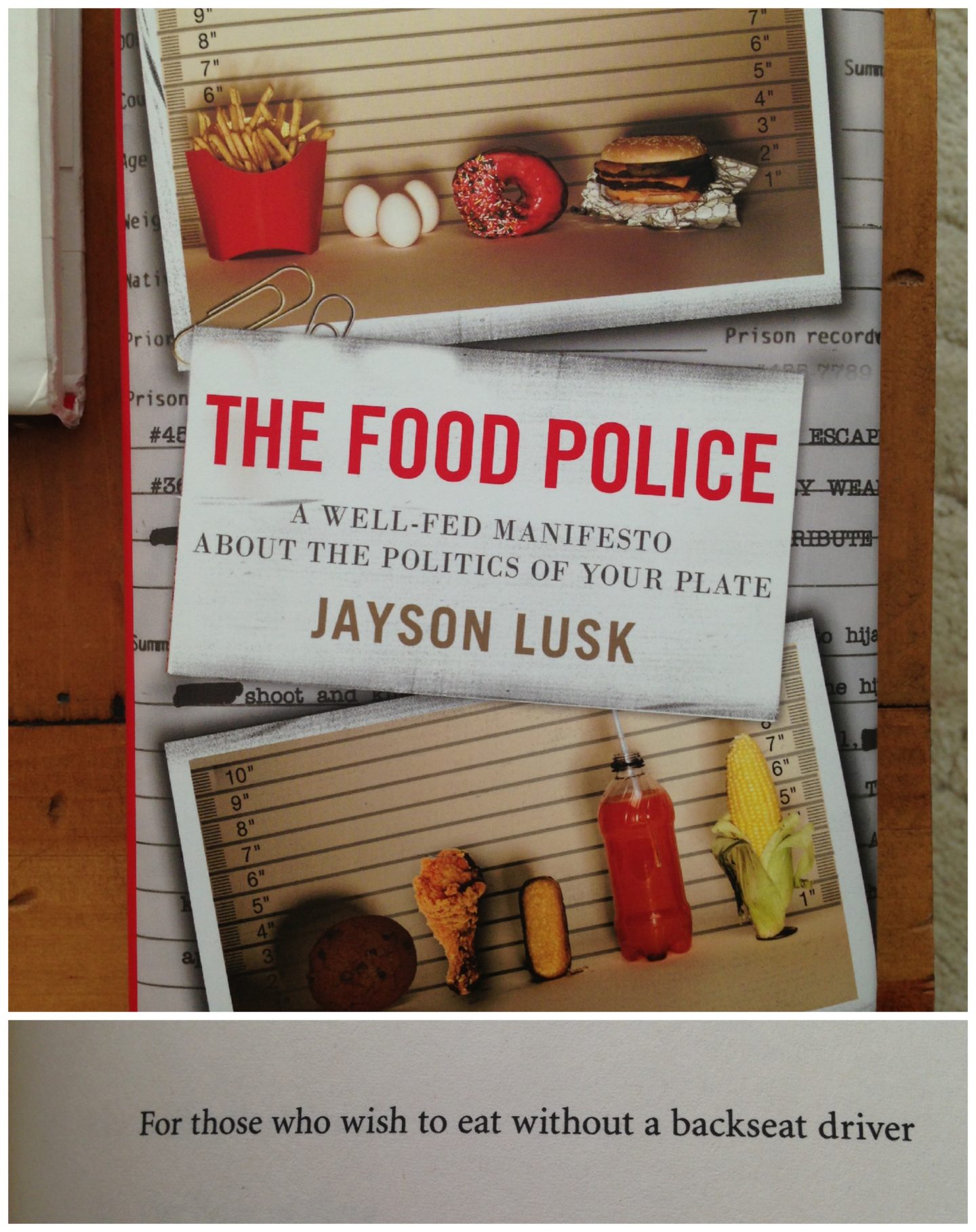
Thanks to my dear father who regularly keeps up with industry news and giving me things to blog about, he saw an interview in Meatingplace magazine featuring the author of a new book that just hit shelves last week. His name is Jayson Lusk and he is food and agricultural economist who also serves as a professor and chair of agricultural economics at Oklahoma State University in Stillwater. But more importantly, he’s the author of a new book called The Food Police: A Well-Fed Manifesto About the Politics of Your Plate. Upon my Dad’s comment to me about the book, I looked it up and pre-ordered it. I received it early last week and immediately started in on the book. And unlike most books out there right now about food, Lusk coins the term “food police” and gives us an honest, real look into the politics and romanticism surrounding our food. So who are the food police…? And according to the overwhelming amount of evidence Lusk produces in the first chapter, everything from trans-fat bans, Happy Meal bans to local food subsidies and purchasing requirements, dirt taxes, foie gras ban, the food police are indeed trying to control our dinner tables and wallets with regulation and when that doesn’t work, they turn to ideology and fear. We all know these people. These are the people who feel morally and ideologically superior because they don’t ever eat at McDonald’s or eat something that came from WalMart, these are the people who preach their method of eating is the ONLY way, these are the people who spit in the face of science and refuse to believe when time and time again something has been proven safe and healthy, these are the food police. Lusk even brings up the example that these same people are fighting for women’s choice when it comes to their bodies, yet they want to tell us what we can and cannot put in our bodies.  Lusk views food through the eyes of the food economist. He says, “my passion became learning why people ate the things they did and figuring out how people dealt with the difficult trade-offs between health, safety, and taste when their paychecks wouldn’t let them have it all.” And he also claims that economics isn’t really about the financial markets, it is instead about “the study of how we make decisions when our wants are bigger than our wallets. Food economists spend their time thinking about how to eat more and better with less; providing information about food supply-and-demand conditions to farmers, agribusinesses, nonprofits, consumers and government agencies; and projecting the impacts of private and government decisions” when it comes to food. I am just a few chapters in, but I must say this book is hard for me to put down. It’s interesting, it’s intriguing, it’s unlike any other food book I’ve read. It brings reality in and takes the romanticism out of our food. It sheds a light on the serious politics that is behind our food. For more information on Lusk, check out his website. Or this wonderful interview Meatingplace did with him. And pick up his book, The Food Police! I’d love to hear more of my fellow food eaters as well as Aggies perspectives on this book!
Lusk views food through the eyes of the food economist. He says, “my passion became learning why people ate the things they did and figuring out how people dealt with the difficult trade-offs between health, safety, and taste when their paychecks wouldn’t let them have it all.” And he also claims that economics isn’t really about the financial markets, it is instead about “the study of how we make decisions when our wants are bigger than our wallets. Food economists spend their time thinking about how to eat more and better with less; providing information about food supply-and-demand conditions to farmers, agribusinesses, nonprofits, consumers and government agencies; and projecting the impacts of private and government decisions” when it comes to food. I am just a few chapters in, but I must say this book is hard for me to put down. It’s interesting, it’s intriguing, it’s unlike any other food book I’ve read. It brings reality in and takes the romanticism out of our food. It sheds a light on the serious politics that is behind our food. For more information on Lusk, check out his website. Or this wonderful interview Meatingplace did with him. And pick up his book, The Food Police! I’d love to hear more of my fellow food eaters as well as Aggies perspectives on this book!








I just started reading it, too, and can’t wait for some “scheduled” reading time this weekend to dive in. Looking forward to comparing notes and thoughts!
I definitely want to read this!
I’m curious to hear what he says about people like me – those who have taken up niche market farming in response to markets. Keep us posted on your thoughts, please!
Author
Will do Carolyn!!
Thanks for the suggestion, excited to read it! The real question is how long will it be until the Dickinson library gets it??
Sounds like a great read! Definitely want to read it.